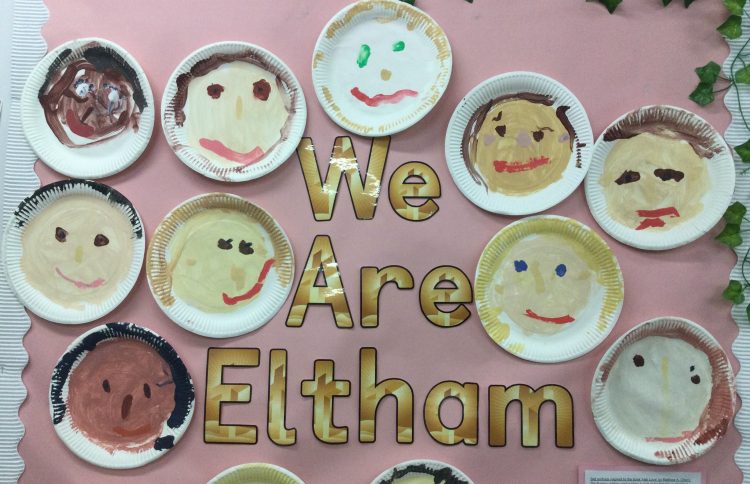
Inclusion at Eltham CofE

At Eltham we are committed to meeting the needs of all learners
Eltham C of E Primary School fully upholds the values and principles of the Code of Practice for pupils with SEND (January 2015). As a church school, with strong Christian beliefs, we aim to develop in every child the knowledge, concepts, skills and attitudes that will enable them to reach their full potential in relation to God and society. At Eltham C of E we are committed to ensuring that we meet the educational and emotional needs of all our pupils; we do this by taking account of the children’s’ varied life experiences and needs and adapting our practice and environment as needed.
This page outlines those with responsibility for inclusion within our school and how we identify and support children with Special, Educational Needs or Disabilities. For more detailed information please see our Inclusion Policy and SEND Local Offer which are linked at the bottom of this page.
Who are the best people to talk to in this school about my child’s difficulties with learning/ Special Educational Needs/Disability (SEND)? How can I talk to them about my child if I need to?
Your child’s class teacher: Class teachers are on the playground at 3.30pm or you can contact them to arrange a meeting through the school office. Class teachers, with support from the Inclusion Team, are responsible for ensuring that all children have access to quality first teaching and that the curriculum is adapted to meet your child’s individual needs (also known as differentiation). They will check on the progress of your child and identify and plan any additional help your child may need, with the support of the SENCO and AHT for Inclusion, as necessary (this could be things like targeted work, additional support, adapting resources etc).
Our Inclusion Team: Miss Hoare (SENCO) and Miss Gardiner (Assistant Head Teacher Inclusion) can both be contacted through the school office. They are responsible for coordinating all the support for children with special educational needs and or disabilities, and developing the school’s SEND and Inclusion Policy to make sure all children get a consistent, high quality response to meeting their needs in school.
If you have any concerns about your child’s progress please let their class teacher know in the first instance. If you are not happy that your concerns are being managed and that your child is still not making progress, you should speak to the SENCO or AHT Inclusion.
What are the different types of support available for children with SEN and or disabilities at Eltham C of E?
- Class teacher input through quality first classroom teaching; putting in place different ways of teaching so that your child is fully involved in learning in class. This may involve things like using more practical learning or providing different resources adapted for your child.
- Specific small group work. This type of support is available for any child who has specific gaps in their understanding of a subject/area of learning. These are often called intervention groups.
- Specialist groups run by outside agencies e.g. Speech and Language Therapy OR Occupational Therapy groups.
- Specified Individual support for your child in school of, as a guide, 21 hours or more. This is provided via an Education, Health and Care Plan (EHCP) or if your child has had this type of support for some time, may be provided by a Statement of Special Educational Needs. This means your child will have been identified by the SENCO/AHT Inclusion as needing a particularly high level of individual and small group teaching (as a guide, 21 hours or more, in school), which cannot be provided from the resources already delegated to the school. An EHCP must be applied for through the local authority.
How will the school let me know if they have any concerns about my child’s learning in school?
When a teacher or a parent has raised concerns about a child’s progress and targeted teaching has not met the child’s needs, the teacher will raise this with the SENCO and AHT Inclusion.
There are meetings every term between each class teacher and a senior staff member in the school to ensure all children are making good progress. This is another way your child may be identified as not making as much progress as expected.
If a child continues to make limited progress after targeted teaching in class, the school will make a decision about whether to set up an intervention group and will inform you via a letter home.
If your child is still not making expected progress after a period of intervention, the school will discuss with you:
- Any concerns you may have
- Any further interventions or referrals to outside professionals to support your child’s learning
- How we can continue to work together to support your child at home/school
How will the teaching be adapted for my child with learning needs (SEN and or disabilities)?
Class Teachers plan lessons according to the specific needs of all groups of children in their class, and will ensure that learning tasks are adjusted in order to enable your child to access their learning as independently as possible.
Specially trained support staff can implement the teachers modified/adapted planning to support the needs of your child where necessary.
Specific resources and strategies will be used to support your child individually and in groups.
Planning and teaching will be adapted on a daily basis if needed to meet your child’s learning needs and increase your child’s access to what is on offer.
How will we make arrangements to ensure that the social emotional needs of your child are met in school?
We have a qualified school counsellor who visits twice weekly. This service can be accessed through discussions with your child’s class teacher and AHT Inclusion.
We work with the Speech and Language service to run weekly social communication groups as necessary from Reception to Year 6.
The school is able to make referrals to Greenwich CAMHS (Child and Adolescent Mental Health Service).
Dyslexia Friendly School
In July 2016 we gained Dyslexia Friendly School status. A dyslexia friendly school is a school that is able to identify and respond quickly and effectively to the challenges that a dyslexic learner may encounter and ensure their needs are met. We recognise dyslexia as a specific learning difference and ensure that our environment and classroom practice meets the needs of dyslexic learners. We are committed to ensure that if children do not learn the way we teach, we will teach the way they learn, actively developing our experiences and the body of research available.
